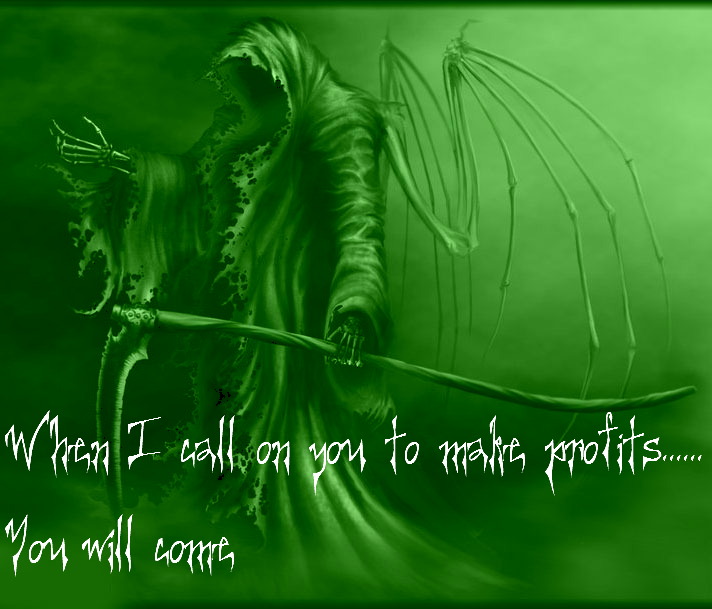| Followers | 187 |
| Posts | 674725 |
| Boards Moderated | 0 |
| Alias Born | 10/14/2012 |
Sunday, December 10, 2017 2:09:50 AM
Compensated Awareness Post View
Disclaimer
What Owning A Stock Actually Means
Most people realize that owning a stock means buying a percentage of ownership in the company, but many new investors have misconceptions about the benefits and responsibilities of being a shareholder. Many of these misconceptions stem from a lack of understanding of the amount of ownership that each stock represents. For large companies such as IBM (NYSE:IBM) and General Electric (NYSE:GE), one share is merely a drop in the pond. Even if you owned $1 million worth of shares, youll still be a small potato with very little equity in the actual company. So what does this mean? Lets take a look.
Misconception No.1: I am the boss.
First of all, youre better off not thinking that you can bring your share certificates into the corporate headquarters to boss people around and demand a corner office. As the owner of the stock, youve placed your faith in the companys management and how it handles different situations. If you are not happy with the management, you can always sell your stock, but if you are happy, you should hold onto the stock and hope for a good return.
Furthermore, next time you are pondering whether youre the only person worried about a companys stock price, you should remember that many of the senior company executives, or insiders, probably own as many, if not more, shares than you do.
This isnt a guarantee that the companys stock will do well, but it is a way for companies to give their executives an incentive to maintain or increase the stocks price. Be careful though: insider ownership is a double-edged sword because executives may get involved in some funny business to artificially increase the stocks price and then quickly sell out the personal holdings for a profit.
Even though you cant directly manage the company with your stocks , if your stock has voting rights, vote for the directors who can. These are the people who typically hire upper management, which hires lower management, which hires subordinate employees. Thus, as an owner of common stock, you do get a bit of a say in controlling the shape and direction of the company, even though this say doesnt represent direct control.
Misconception No.2: I get a discount.
Another misconception is that ownership in a company translates into discounts. Now, there are definitely some exceptions to the rule. Berkshire Hathaway (NYSE:BRK.A), for example, has an annual gathering for its shareholders where they can buy goods at a discount from Berkshire Hathaways held companies. Typically, however, the only thing you get with the ownership rights of a stock is the ability to participate in the companys profitability.
Why would it hurt for you to get a discount? Well, this answer can get a little complicated. After some thought, you probably would not want that discount. Lets look at an example of Bens Chicken restaurant (owned by Ben and a couple of his friends) and Corys Brewing Company (owned by millions of different shareholders). Because only a few people own Bens Chicken Restaurant, the discount would only be a small portion of the restaurants income and revenue, which the owners would bear.
For Corys Brewing Company, the loss in income and revenue would also be borne by the owners (the millions of shareholders), but, because revenue is the main driver of stock price and the loss from a discount would mean a drop in stock price, the loss from a discount would be more substantial for Corys Brewing. So, even though an owner of stock may have saved on a purchase of the companys goods, he or she would lose on the investment in the companys stock. Thus, the discount isnt nearly as good as it initially sounds.
Misconception No.3: I own the chair, the desk, the pens, the property, etc.
As an investor in a company, you own a portion of the company (no matter how small that portion is); however, this doesnt mean that you own property of the company. Lets go back to Bens Chicken Restaurant and Corys Brewing Company. Quite often, companies will have loans to pay for property, equipment, inventories and other things needed for operations.
Bens Chicken Restaurant received a loan from a local bank under certain conditions whereby the equipment and property are used as collateral. For a large company like Corys Brewing Company, the loans come in many different forms, such as through a bank or from investors by means of different bond issues. In either case, the owners must pay back the debtors before getting any money back.
For both companies, the debtors - in the case of Corys Brewing Company, this is the bank and the bondholders - have the initial rights to the property, but they typically wont ask for their money back while the companies are profitable and show the capacity to repay the money. However, if either of the companies becomes insolvent, the debtors are first in line for companys assets . Only the money left over from the sale of the company assets is distributed out to the stock holders.
Conclusion
Hopefully weve been able to dispel any misconceptions that some stock holders have about the powers of ownership. Next time you think about taking your stock certificate into the nearest McDonalds (NYSE:MCD) to get a discount on a Happy Meal, fire the employee after he refuses to give it to you, and finally walk out in disgust with a McFlurry machine, you should remind yourself of this article.
Join the InvestorsHub Community
Register for free to join our community of investors and share your ideas. You will also get access to streaming quotes, interactive charts, trades, portfolio, live options flow and more tools.










